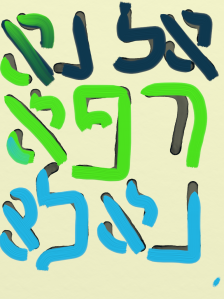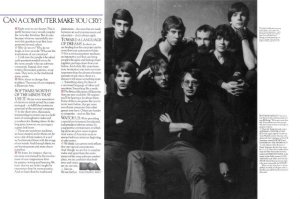 Since February, my mom had beendead -- suddenly, without real reason. Now my family celebrates The High Holidays so differently. There is no family dinner that mom took two days off of work to cook, using the same pots she has for years. Due to differing timing of services, Sweetie and I cannot even eat at a family meal like I have for so many years. Timing doesn't work out --
Since February, my mom had beendead -- suddenly, without real reason. Now my family celebrates The High Holidays so differently. There is no family dinner that mom took two days off of work to cook, using the same pots she has for years. Due to differing timing of services, Sweetie and I cannot even eat at a family meal like I have for so many years. Timing doesn't work out --For my family, there is a chain restaurant to replace the family meal at home. For us, dinner with friends.
The liturgy has a kind of centerpiece of this season. The Netana Tokef reminds us this is the season where we are judged on Rosh Hashanah and inscribed in the book. On Yom Kippur it is sealed. Who is to live this year, and who is to die. With my
Moms death, this brings up many questions, including the big one: Why did she die now? Why was such a compassionate, good woman inscribed and sealed in the Book of Death? What did she do to deserve that? There are people in this word who are hate filled and spread their hate to all who listen, why should they live and my mom, one of the most giving, caring people I have ever known, have to die?
I have no answers, I can only explore. I, along with many others have never liked the Netana Tokef theology. I have in other of these commentaries changed the Book of Life to the Book of Fully Living. It is not just enough to live, but to make the most of your circumstances to live fully -- to make your world and the world around you a better, happier more complete place. To learn and grow,to engage with God, to perform deeds of kindness -- that is fully living. As the liturgy reminds us every morning, as quoted from the Perkei Avot, the word stands on those three things: on Torah, Avodah, and Gemilut hasidim.
Pondering that, it is time for services, and I walk into the evening service. I hurt, and by the end of the service I hurt so much, I am numb. It makes no sense, I cannot pray at all. Halfway through the Amidah, a page before Modim Ananchnu Lach, I just sit down. It just becomes too difficult -- I feel nothing, I feel no connection. Later, I say the words of the Mourners Kaddish like a zombie -- there is nothing of my soul in me -- it too seems dead. Prayer has left me, and I fell no connection, I feel there is no one to serve. God and I are no longer talking to each other. Sweetie drives me home and I collapse into bed.
The next morning, the numbness is gone but the hurt remains. While dressing that morning, I think about how wonderful it would have been for Sweetie to spend more time with my mom, to go shopping and with her, for them to go to their favorite restaurant and share their favorite pizza.
When I get to the synagogue , and services start, I still cannot pray. I cannot even look at the words in the prayerbook -- although it is bulky, I usually can hold it with no problem. Today, I cannot even hold it. I go through much of the prayers by memory. My mind wanders to the trees outside, behind the window framing the Ark and the Torahs within it. I remember similar windows a long time go, and in my mind I am forty years in the past, in Rochester New York, standing between my mom and my dad, fidgeting at Rosh Hashanah services on my metal bridge chair. The synagogue I remember was rather dark, with a very large 3 steeple-like roof meant to be a tent held up by poles behind the Aaron Chodesh. The steeple behind the Ark was a diamond of glass, and bees or hornets would always be flying into it. I spent many a service looking up into that window out into the grey featureless sky beyond. My mom would point to an English paragraph in the Machzor with a look that told me I should read it. Following my mom’s instructions, I always did.
We stand up for Barchu, and I’m brought back to the present -- though there is a connection to my memory. In Rochester, that conservative prayer book never spoke to me, the english translation was a religion that I did not understand or accept -- the words about Ribbono Shel Olam, HaMelech are so empty and meaningless. There is no connection to something greater for me. In the present, everything I do is so half-hearted, so seemingly meaningless. Eventually we get to the Netana Tokef and we sing in Hebrew the concluding lines “but charity, prayer and repentance cancel the stern decree” as it would be translated in that conservative prayerbook. For the first time today I feel something. I want to scream across the room “BULLSHIT!!!!!!!”. I don’t, though. Instead I cry, tears streaming down my face. Then I hear the rabbi repeat the English for what we just sang in Hebrew., yet with a change: The English uses “comforts us” instead of cancels. Once again we are in the silent Amidah, and once again I cannot pray, I sit down without completing it, bewildered at what I am feeling. Like my mom told me to do decades ago, I look down at the text and begin to read a Reconstructionist response to Netana Tokef, and by extension, to much of the theme of Rosh Hashana. I’ve heard it in other forms before. There is stuff we are able to control, but there is a lot that we are powerless about. To acknowledge that we are powerless and admit that we need to trust God for those things is what ths is about. We do not choose the day of our death -- God does. Nothing we do changes that. But we can make the world a better place in the meantime, and know that it is so for our efforts.
That for me still isn't enough comfort. A kind deed, a small act of Gemilut Hasidim strengthens me enough to get home. I drive a fellow congregant to the train so he doesn't have to stand in the rain waiting for a bus. A thought occurs to me, one I don't like and have a hard time accepting.
What if one person lives life so fully, that it shadows others from doing so? Was my mom so good to all of us, that we could not grow into being as good as she was? Was her death removing her from the picture so we could truly live? Even with all the challenges that are before me personally, all the places I have to rise to the occasion, I have a he'd time believing this. I have not succeeded in many of them, and the future does not look bright for my success. I still don't know what to believe.
I have no answers, Rosh Hashanah leaves me with none. All I am left with is the dread of Yom Kippur, when Yizkor raises it's ugly head for the first time. Will I connect with God sometime in this holiday? I don’t know, but I fear the gates are closed to me.










